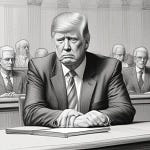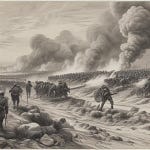This Day in Legal History: Harlan Fiske Stone Dies
On April 22, 1946, the United States Supreme Court lost one of its distinguished jurists, Chief Justice Harlan Fiske Stone, who died unexpectedly at the age of 73 while still serving on the bench. Appointed as Chief Justice in 1941 by President Franklin D. Roosevelt, Stone had originally been nominated to the Court as an Associate Justice in 1925 by President Calvin Coolidge. His tenure as Chief Justice was marked by a strong commitment to the principles of judicial restraint and a profound respect for the Constitution.
Stone's legal philosophy was notably pragmatic and centered on a belief in judicial deference to the decisions of Congress and the executive, except in clear cases of constitutional violation. This approach was reflective of his broader views on the role of the judiciary in American democracy, emphasizing that courts should not interfere with policy decisions unless absolutely necessary. Under his leadership, the Court navigated through complex issues including war-time rights, separation of powers, and economic regulation.
Chief Justice Stone is particularly remembered for his opinion in the landmark case of United States v. Darby in 1941, which upheld the Fair Labor Standards Act and marked a departure from the Court's earlier resistance to extensive federal regulation of the economy. This decision demonstrated his nuanced understanding of the balance between state and federal powers and his support for broader legislative authority in economic matters.
During his time as Chief Justice, Stone also oversaw the filling of all seats on the Court, shaping its composition and, indirectly, its jurisprudence. He was instrumental in fostering a collegial atmosphere among the justices, despite the ideological differences that often characterized the Court's deliberations.
Stone's sudden death, from a cerebral hemorrhage suffered during a public session of the Court, marked a dramatic close to a career deeply embedded in the fabric of American legal history. His death underscored his dedication to his role, having served until his very last moments. His legacy is reflected in the decisions and directions the Court took under his stewardship, especially in the affirmation of federal power and the protection of civil liberties.
Harlan Fiske Stone's era as Chief Justice was a pivotal period in the Supreme Court's history, reflecting a transition in American jurisprudence from strict constitutional literalism to a more flexible, interpretative approach that considered the realities of a changing society. His leadership helped steer the Court through the turbulence of the Great Depression, World War II, and the beginning of the Cold War, leaving a lasting impact on the judicial landscape of America.
The U.S. Supreme Court is revisiting the issue of homelessness for the first time in 40 years, taking up the case of Grants Pass v. Johnson. This case emerges from a small city in Oregon, known for its natural beauty, where local ordinances impose fines on individuals sleeping in public with bedding, a matter now being evaluated under the Eighth Amendment's clause against cruel and unusual punishment. Grants Pass, despite its growth and beauty, lacks permanent public shelters, leading homeless advocates to support the removal of such punitive measures due to the absence of housing alternatives.
The city argues that such issues should remain under local and state jurisdiction, allowing for more creative, localized solutions. Meanwhile, opposing voices, including various scholars and homelessness advocates, argue that these laws unfairly penalize the involuntarily homeless and potentially shift focus from penalization to more constructive solutions like increasing housing availability. This case could set a significant legal precedent affecting how municipalities nationwide address homelessness.
The Ninth Circuit Court previously struck down the Grants Pass ordinances, siding with those who argued that without sufficient shelter space, individuals have no choice but to sleep outside, thus making the city's fines for public sleeping inherently unjust. The Supreme Court's prior engagement with homelessness was decades ago, focusing more on protest rights than the broader implications of homelessness laws.
With homelessness rates at a record high across the U.S., the outcome of this case could redefine the legal landscape surrounding how cities manage their homeless populations. It reflects a critical juncture where the judiciary may redefine the boundaries of local governance in dealing with social crises, especially when it comes to balancing punitive measures with human rights considerations.
Supreme Court Tackles Homelessness for First Time in Decades
Top law firms are increasingly bypassing traditional on-campus recruiting events, opting to engage directly with potential recruits earlier in their academic careers. This shift, driven by the desire to secure top talent before competitors, involves firms offering positions to law students before they complete their first year, significantly ahead of the usual on-campus interviews (OCI) controlled by law schools and the National Association for Law Placement (NALP). As a result, firms like Morrison Foerster indicate that direct hires might comprise about half of their new class, as waiting for OCIs might cause them to miss out on desirable candidates.
This trend has led to a snowball effect with other major firms like Weil Gotshal & Manges and Jones Day opening their applications for summer programs well before traditional timelines, sometimes as early as mid-April. This causes them to make hiring decisions based on a smaller academic record, compressing the timeline for law students to decide their career paths. Moreover, the pandemic has facilitated a shift towards virtual interviews, further speeding up the recruitment process and allowing more firm partners to participate without the logistical challenges of travel.
However, this compressed timeline poses challenges both for students, who have less time to understand their legal careers fully, and for firms, which must ensure they are still hiring candidates who will succeed in the long term. To adapt, some firms, like Morrison Foerster, are considering incorporating new assessments or writing exercises into their interview processes.
Law schools are also adjusting to this new landscape by moving their OCI sessions earlier, as seen at Howard University and other top schools like Yale and Stanford. This aligns more closely with the timing of firm applications, putting additional pressure on students to make quick decisions, often with incomplete information from their first year of studies.
The changes in recruiting practices reflect a broader move towards a more aggressive, market-driven approach to hiring, emphasizing efficiency and early engagement with potential hires. This evolution in the legal recruitment field underscores the competitive nature of hiring for prestigious law firms and the significant impact these early decisions can have on the careers of young lawyers.
Big Law Skips Ahead of On-Campus Recruiting in Race for Talent
The criminal trial of former U.S. President Donald Trump has commenced in New York, marking the first-ever trial of a former president. Trump faces 34 counts of falsifying business records, related to a $130,000 payment made to porn star Stormy Daniels by his former lawyer, Michael Cohen. This payment, intended to ensure Daniels' silence about an alleged sexual encounter with Trump, is accused of misleading voters during the critical final stages of the 2016 presidential campaign. Trump has denied the allegations, pleading not guilty to all charges.
Prosecutors are presenting this case as part of a larger "catch and kill" strategy, where Trump, along with Cohen and David Pecker, former CEO of American Media, aimed to suppress damaging stories prior to the 2016 election. This strategy reportedly included payments to Daniels and former Playboy model Karen McDougal, both intended to prevent stories about Trump's extramarital affairs from surfacing. American Media, under Pecker's leadership, admitted to these practices as part of a non-prosecution agreement.
The trial will feature testimony from Pecker and at least 20 other witnesses, with proceedings expected to last six to eight weeks. Cohen, a central figure in the case, may face credibility challenges due to his own legal history. Trump's defense argues that the payments were personal matters and not campaign-related expenditures.
The legal battle unfolds as Trump remains a significant figure in American politics, actively campaigning for a return to the presidency in a tight race against Joe Biden. Despite the charges, Trump's political support among Republicans has surged. The trial's outcome could influence the broader political landscape, especially as Trump also faces other criminal charges related to different aspects of his political and post-presidential activities.
Trump hush-money trial kicks off with opening statements in New York | Reuters
TikTok has voiced concerns about a bill passed by the U.S. House of Representatives that could lead to a ban of the app if its Chinese owner, ByteDance, does not divest its stake within a specified timeframe. The bill, which saw a significant majority approval in the House, is now headed to the Senate and has the support of President Joe Biden. U.S. officials, including members from both major political parties and the Biden administration, argue that TikTok poses a national security risk due to potential data sharing with the Chinese government.
TikTok, however, has refuted claims that it has shared or would share U.S. user data and insists that the bill infringes on the free speech rights of its 170 million American users. The company has likened the move to censorship, echoing its response to a previous state-level ban in Montana. Additionally, the American Civil Liberties Union and other free speech advocates have criticized the bill, suggesting it does not effectively counter the broader issues of data privacy and foreign disinformation efforts.
Senator Mark Warner expressed concerns on national television about TikTok being used as a propaganda tool by the Chinese government, while others argue for the necessity of more robust data privacy legislation rather than a ban. Representative Ro Khanna mentioned that a ban might not hold up under legal scrutiny due to constitutional free speech protections. Amidst these debates, the bill aims to accelerate the divestiture process by setting a firmer deadline for ByteDance, underlining the ongoing geopolitical tensions surrounding technology and data security between the U.S. and China.
TikTok says US House bill that could ban app would 'trample' free speech | Reuters
















Legal News for Mon 4/22 - SCOTUS Revisits Homelessness, Big Law Recruiting 1Ls, Trump's First Criminal Trial Begins